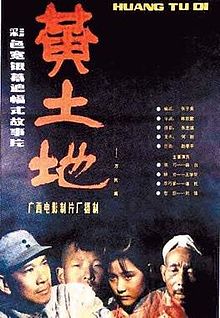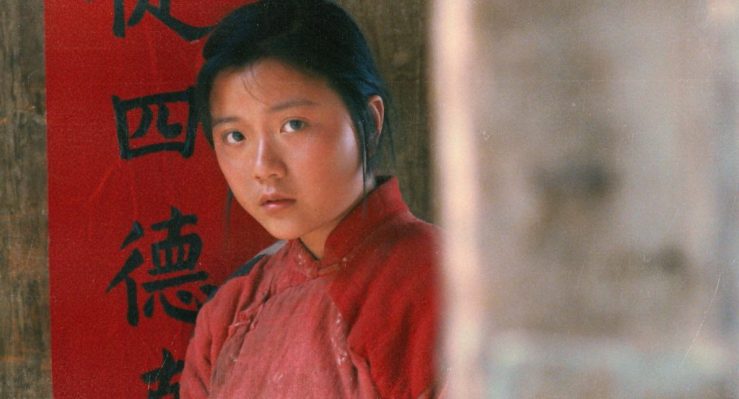 ‘Amongst human beings, a girl’s life is the most miserable’
‘Amongst human beings, a girl’s life is the most miserable’
The film opens in Spring 1939 as Lao Gu [Wang Xueqi], a soldier in the Communist Eight Route Army, is sent to a remote and poor part of the Loess Plateau (in Shaanxi province) to collect folks songs (the same general area as appears in Old Well).
It is directed by Chen Kaige in his debut feature film and with photography by Zhang Yimou.
The area is arid and the local people (mainly the women) have to walk up to five kilometres to the Yellow River to draw water.

We see Gu appearing over the horizon, then switch to a shot of a wedding celebration before the camera picks out Cuiqiao [Xue Bai] in the crowd. The area is so poor they have wooden fish at the wedding banquet just to give the idea of plenitude.

 Even today, this is a strikingly original film. While one can identify elements of the film in earlier Chinese cinema, the combination (of local music, vibrant colour, dramatic cinematography and a story which reworks standard plots) remains stunning. This is what White-Haired Girl should have looked like.
Even today, this is a strikingly original film. While one can identify elements of the film in earlier Chinese cinema, the combination (of local music, vibrant colour, dramatic cinematography and a story which reworks standard plots) remains stunning. This is what White-Haired Girl should have looked like.
Gu is boarded with an ageing local farmer [Tan Tuo] (he’s 47) and his 14 year-old daughter Cuiqiao and almost silent son Hanhan [Liu Qiang] (an older daughter is unhappily married in another village). Gu collects songs while helping the family to plow their land.
His arrival leads to a clash of attitudes with the traditional father, especially on the role of women. Cuiqiao is amazed to discover that men can sew while the father takes badly to the idea that women can choose their own husbands.
Suddenly, Cuiqiao’s prospective in-laws appear to prepare for her impending wedding. I say ‘suddenly’ but while this occurs suddenly in the narrative (syuzhet), it is obviously well-known to everybody in the story except Gu and a long-established part of the fabula. She has been betrothed since childhood and her dowry has already been received and spent.
Gu leaves to return to Yanan but meets Cuiqiao on his path who asks him to take her to join the Red Army. He refuses but promises to return. After her marriage, Cuiqiao tries to cross the Yellow River in a small boat to reach the Red Army.
The film represent a striking break with the past of Chinese cinema. The plot is a simple one but can be read at many different levels and the film raises more questions than it answers. Does the CCP represent the future of China or does the rain dance at the end of the film represent a rejection of modernity? Does modernity promise emancipation to women like Cuiqiao or is it (like Gu’s pledge to return) a false promise?
Produced by Guanxi Film Studios, it won the Golden Rooster award for best photography only.

[…] use of skyline) but this is a much mor realistic film and eschews the mythic element in films like Yellow Earth or Red Sorghum. In many ways it has more in common with the 1980 films of Wu Tianming such as Old […]
LikeLike